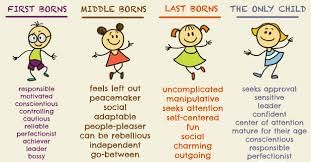Sibling Order And The Child s Development!
The child’s serial order among the siblings the siblings is one of them. It has an influence on the individual’s personality and patterns of behavior e.g. a second born child plays a ‘satellite’ role in many of his interactions with the older, since the first born may act as the natural leader of the siblings in the family constellation. How ordinal positions, the two most important of which is the sex of the child and how individuals feel about the roles they are expected to play.
First Born :
Behave in more mature way because of association with adults also they are expected to assume responsibilities and so leadership abilities are more developed.
Present to serve as models for younger siblings and to assume some of their care.
Tend to be under pressure of living up to the parents’ wishes.
Have feelings of insecurity and resentment as a result of more attention being given to the second born siblings.
Usually are high achievers because of parental pressures and expectations and a desire to win back parental approval if they feel, they are being replaced by the younger siblings.
Middle Born:
Learn to be independent and adventure; some as a result of greater freedom, having fewer responsibilities than first born which they often interpret as inferiority. This often discourages the development of leadership qualities.
Become resentful or try to emulate the other’s behavior when compared unfavorably with an older sibling.
Act up and break rules to attract parental attention to themselves and take it away from older or younger siblings.
Develop the habit of being underachievers as a result of fewer parental expectations and less pressure to achieve.
Last born :
Experience good social relationships outside the home and are generally popular but infrequently have leadership’s qualities because of lack of willingness to assume responsibilities.
Tend to be happy because parents of attention and ‘spoiling’ from family members during early childhood.
Are usually protected by parents from physical or verbal attack by older siblings and this encourage dependency and irresponsibility.
Tend to be willful and demanding as a result of less strict discipline and spoiling by the family members.



+1.svg)
